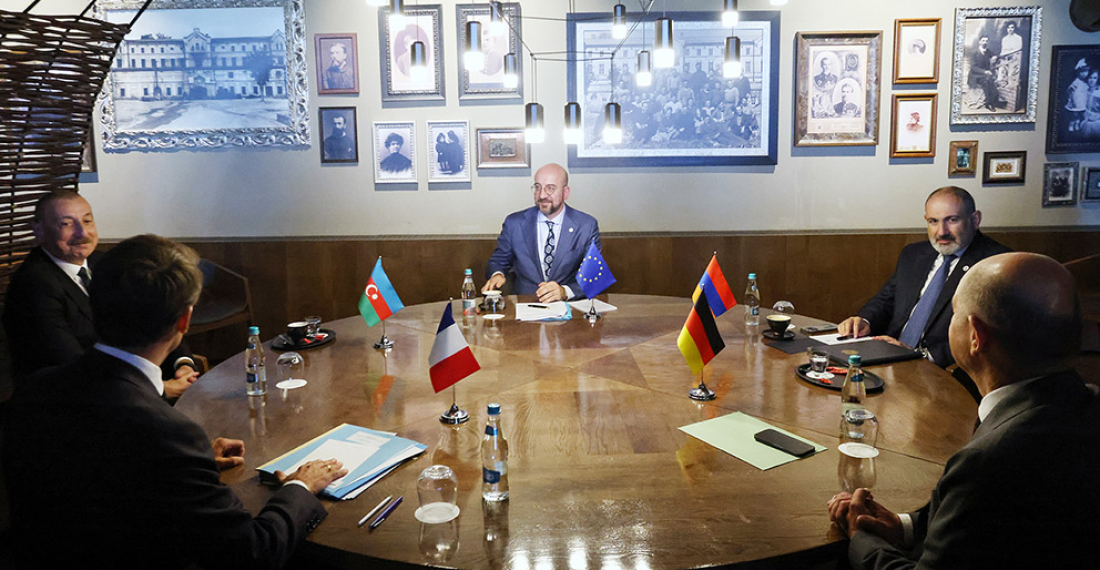This briefing first appeared in the 9 June 2023 issue of our newsletter, Karabakh Concise. If you would like to subscribe to Karabakh Concise, or any other of our newsletters, please click here.
Intense diplomatic efforts over the last month are a good reflection of a sustained determination on the part of Armenia and Azerbaijan to bring their decades-old conflict to an end, and sign a peace agreement, writes commonspace.eu.
Meetings between president Ilham Aliyev of Azerbaijan and prime minister Nikol Pashinyan of Armenia were held in Brussels on 15 May, with the mediation of EU Council president Charles Michel. The three leaders met again on 1 June in Chisinau, this time also with the participation of French President Emmanuel Macron and German Chancellor Olaf Scholz. Aliyev and Pashinyan met, together with president Putin of Russia, in Moscow on 25 May. And on 4 June the leaders of both Armenia and Azerbaijan were in Ankara for the inauguration of President Recep Tayyip Erdogan’s new term in office, where they also met informally. The next formal meeting is now set to be held in July in Brussels.
A lot is also going on behind the scenes with European and American envoys travelling in the region. EU Special Representative Toivo Klaar met Pashinyan in Yerevan on Tuesday (6 June) and later this week is expected in Baku for a meeting with Aliyev. Turkey, already engaged in a process of normalising its own relations with Armenia, now appears to be also weighing in, with the new Turkish foreign minister Hakan Fidan reportedly discussing both Armenia-Turkey and Armenia-Azerbaijan relations in his first telephone conversation with US Secretary of State, Antony Blinken.
Establishing solid inter-state relations after decades of war and animosity is not a simple task, as the two sides are finding out. Azerbaijan wants a deal as soon as possible, and Armenia has stated that it thinks a deal is possible before the end of the year. Time is not on the side of peace. Continued incidents on the ground, a volatile international situation, and domestic considerations, make every day that passes a test for the sustainability of the peace process. But the general feeling is that the two sides are now much more advanced than they have ever been, and it is now time to clinch the deal.
The future of the Armenians of Karabakh remains the most serious stumbling-block
Whilst there is no shortage of issues on which work between Armenian and Azerbaijani negotiators needs to continue, the single most difficult issue that has emerged is the future of the Armenians living in Karabakh. The general impression appears to be that Baku needs to discuss with the community directly, but that Yerevan is an interested party and having the issue resolved is a precondition for a final agreement.
Azerbaijan has so far said very little as to what its plans for the territory are, short of saying that all individual rights of the population will be guaranteed. “We have a plan but we are not going to announce it yet”, a senior Azerbaijani official said recently. Part of the problem is dealing with the current political structures in the Armenian “self-declared” Nagorno-Karabakh Republic, which Azerbaijan does not recognise. President Aliyev hinted recently of a willingness to give an amnesty to all those involved in these structures, but this was met with derision on the part of many Karabakh Armenians. There is then the issue of whether these discussions can realistically be held without some kind of international mediation.
Yerevan officials continue to emphasise the need for any future arrangements in Nagorno-Karabakh to be internationally guaranteed, and for an international presence to oversee the process. So far Azerbaijan has rejected outright any international peace-keeping force, and flatly says that Russian forces deployed under the provision of the November 2020 Armenia-Azerbaijan-Russia trilateral statement, must leave as planned in 2025 at the latest.
However, an international presence can take many shapes and forms. It may be civilian, and deployed only in an observation capacity, or it can be political, providing a safe space for political interaction. Or it can even be strictly diplomatic, in the form of consulates of major powers in Stepanakert/Khankendi. In the current ongoing megaphone diplomacy between Baku and the Karabakh Armenians it is difficult to identify what is the maximum Baku is ready to give, and what is the minimum that Stepanakert is ready to accept, but this discussion must now start.
Many are also of the view that given the realities on the ground and the broader regional picture, what should matter for both sides is how to build trust so that any agreement has a good chance to work.







